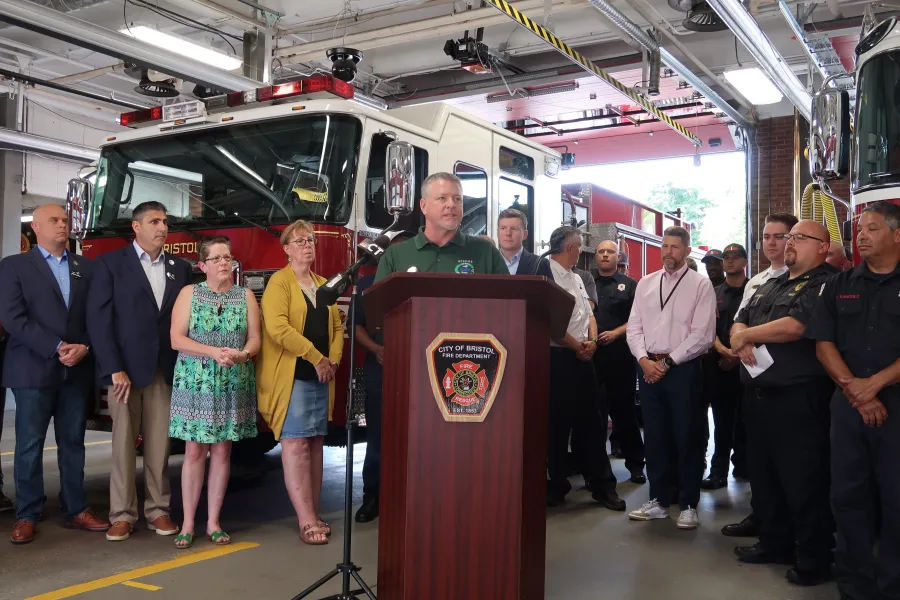Press Coverage (Courant): "Suicide is the leading cause of police fatalities. Advocates say CT limits who can get help"

This story was published by the Hartford Courant on June 21, 2024 and can be found on their website HERE.
The recent high profile deaths of Connecticut police officers has drawn an outpouring of sympathy and gratitude for police sacrifice and service, but police officers are more likely to die by suicide than be killed in the line of duty, officials say. And advocates are concerned the state is restricting who can get help.
In 2020, 116 police officers in the United States died by suicide, while 113 died in the line of duty. In 2021, that number rose to 150 officers dying by suicide, according to law enforcement suicide data collection by the FBI. In addition, law enforcement officers have a 54% increase in suicide risk compared to the civilian population.
And while the month of June is often seen as a time for fun and relaxation, this month marks the 10th anniversary of Post-Traumatic Stress Disorder Awareness Month, a time dedicated to raising awareness and educating others about an often stigmatized mental health condition. PTSD is often brought upon by stressful conditions and traumatic events, common occurrences for those responding to emergencies on a daily basis.
“Our goal is clear: to ensure every trooper knows they are not alone, and that seeking help is a sign of strength and not weakness,” said Connecticut State Police Sgt. Luke Davis at a press conference surrounded by law enforcement and officials on Thursday. “By investing in their mental health, we are investing in the resilience and effectiveness of our entire force.”
Davis joined several other speakers including; Comptroller Sean Scanlon, Bristol Mayor Jeff Caggiano, state Sen. Cathy Osten, state Rep. Mary Fortier, Bristol Fire Chief Rick Hart, Deputy Fire Chief Todd Correll, New Britain EMS Captain Patrick Ciardullo Jody Barr, AFSCME President, Peter Brown, UPFFA President, Jeff Tomchick, UPFFA Legislative Affairs, and Sherri Martin, National Director of Wellness Services for the Fraternal Order of Police, to celebrate the progress made around mental health and recognize the work that still needs to be done.
The press conference, hosted inside the Bristol fire department on N. Main St., not far from where two officers with the department were shot and killed in a brutal ambush in 2022.
“It is very fitting that we are here in Bristol to talk about PTSD, something that is near and dear to my heart,” Caggiano said. “What happened here in October 2022 taught us some great lessons.”
Scanlon and others joined to celebrate the five-year anniversary of the passing of a major state law that extended workers compensation coverage to first responders suffering from PTSD. Previously, workers’ compensation covered mental health injuries only when they were sustained in conjunction with physical injuries. The law, signed by Gov. Ned Lamont in 2019, made Connecticut one of the first states to recognize compensation for PTSD-related injuries.
“We’re here today to make sure that our first responders have access to the mental health care they deserve,” Scanlon said. “So that when and if they experience a traumatic event in the line of duty, that they will be able to get the help they need. In the last five years, many people have stepped up and got that help. But unfortunately, as is the case with all mental health, it’s still very much stigmatized and there’s a lot of people who don’t get help.”
Scanlon said that the issue is personal to him as his Dad, a Vietnam-era veteran and Bronx police officer, died while he was young. The comptroller urged all first responders to seek help when they need it and to not feel embarrassed or ashamed.
“My Dad was one of the toughest guys I ever met, he returned from Vietnam and became a cop in the South Bronx, but he never talked about it,” Scanlon said. “I always think about my Dad when stuff like this comes up. Because while he was that stereotypical tough guy, he was also somebody I know firsthand would have benefited from something like this.”
But many also said that law enforcement officers are still being denied workers compensation coverage due to the current eligibility test for PTSD being too strict. Jody Barr, executive director of the American Federation of State, County and Municipal Employees, said that the law needs to be expanded to cover more traumatic incidents.
“One of our police officer members shot a man who was firing wildly at random motorists,” Barr said. “The officer had to shoot the armed man to protect the public. He then applied lifesaving care to the shooter. He experienced PTSD symptoms after this incident but was denied PTSD workers compensation coverage because the current eligibility rules are so restrictive.”
Under current state law, coverage is available to police officers, parole officers, and firefighters who have experienced one of the following six events:
• Witnessing the death of a person
• Witnessing an injury that causes the death of a person shortly thereafter
• Treating an injured person who dies shortly thereafter
• Carrying an injured person who dies shortly thereafter
• Viewing a deceased minor
• Witnessing an incident that causes a person to lose a body part, to suffer a loss of function, or that results in permanent disfigurement
But Barr and others are advocating for those eligibility rules to be expanded, saying treatment helps get officers and firefighters back to work quickly, an important issue for departments that are already experiencing staffing issues.
“Police officers and corrections officers die about 20 years earlier than the general public due to consistent exposure to potentially traumatic events,” Barr said. “PTSD treatment can help reduce the mortality rate of workers who dedicate their lives to keep the public safe.”
